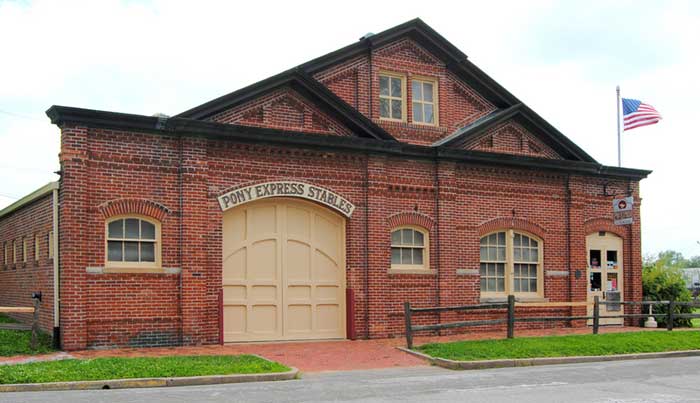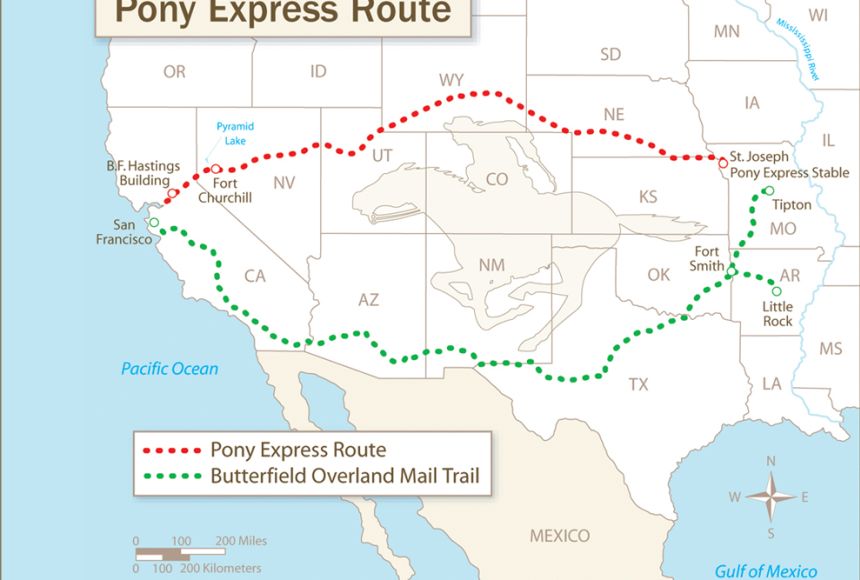
Echoes from the Outpost: What the Pony Express Stations Saw and Heard of America’s Legends
The wind whispers through the skeletal remains of what were once bustling hubs, vital arteries in the beating heart of a young, ambitious nation. We are the Pony Express stations, scattered across the vast and unforgiving American landscape, from the rolling plains of Missouri to the rugged peaks of California. Our walls, though often just rough-hewn timber and sod, absorbed the sweat, fear, triumph, and endless stories of an era defined by expansion and the forging of a national identity. If our silent timbers could speak, they would not just recount the thunder of hooves or the urgent cries of "Mail!" but a tapestry of legends – tales of courage and villainy, of superhuman feats and the quiet, persistent spirit of a people determined to tame a continent.
We were born of necessity, a daring gamble to connect East and West with a speed unheard of in 1860. For a fleeting 18 months, our riders, often "young, skinny, wiry fellows not over eighteen" as one famous advertisement declared, galloped through sun-baked deserts, across treacherous rivers, and over snow-capped mountains. Each of us, a mere dot on a perilous map, was a sanctuary, a changeover point, a momentary pause in an epic dash. And in those brief, breathless moments, as horses were swapped and mail pouches exchanged, we became unintended custodians of America’s nascent mythology. From our vantage point, situated at the very edge of civilization and the heart of the wild, we bore witness to the birth and propagation of legends that continue to define the American spirit.
The earliest whispers carried by the weary travelers who sought refuge within our walls were of the mythical figures who shaped the very land itself. These were the giants, born of the pioneer’s struggle against an overwhelming wilderness. There was Paul Bunyan, the colossal lumberjack whose mighty axe cleared forests with a single swing, and whose blue ox, Babe, was so enormous she drank rivers dry and left the Great Lakes as their footprints. We heard tales of Bunyan carving out Puget Sound with his axe and straightening the kinks in the Red River. These weren’t just fanciful stories; they were allegories for the human spirit confronting the seemingly insurmountable task of taming the vast American frontier. They gave meaning to the endless labor, turning back-breaking work into feats of heroic scale. "Every new settler, every new town, every new stretch of railway carved into the wilderness," one of our old station keepers might have mused, "was a small act of Bunyan, a testament to the power of human will."

Then there was Johnny Appleseed, born John Chapman, a gentle, eccentric figure who wandered the frontier for decades, not with an axe or a gun, but with a sack full of apple seeds. He planted orchards, not for personal gain, but to ensure that future generations of pioneers would have sustenance. His legend, passed from mouth to mouth by settlers pushing ever westward, spoke of foresight, generosity, and a deep connection to the land. From our humble stations, we saw the relentless march of pioneers, many of whom carried not just their worldly possessions but also the seeds of a better future. Johnny Appleseed’s story, a quiet counterpoint to Bunyan’s boisterousness, embodied the hope and long-term vision required to build a nation from scratch. He was a real man, yes, but his actions bloomed into a legend that symbolizes nurturing and the promise of abundance in a harsh new world.
As our riders galloped further west, the tales grew grittier, tinged with the smoke of gunpowder and the glint of gold. This was the Wild West, a chaotic crucible where law and order were tenuous, and individual action often dictated survival. Our stations, often isolated and vulnerable, were prime locations for the exchange of news – and legend – about the infamous outlaws and the fearless lawmen who pursued them.
Jesse James, for instance, was a name that echoed with a strange mixture of fear and admiration. To some, he was a cold-blooded murderer and thief; to others, a Robin Hood figure, a victim of circumstance striking back at the powerful railroad barons and banks that seemed to oppress the common man. We heard hushed accounts of his daring train robberies and bank heists, of his uncanny ability to evade capture, and of the loyalty he commanded. His legend, fueled by dime novels and sensational newspaper reports, transformed him from a criminal into a symbol of rebellion against a rapidly modernizing and often unfair system. The details blurred, the facts became malleable, and the myth of the wronged rebel was born.
Similarly, Billy the Kid, or William H. Bonney, became a legendary figure of the New Mexico Territory. A young, charismatic outlaw who seemed to live by his own code, his short, violent life was quickly romanticized. We heard of his daring escapes, his skill with a gun, and his defiant spirit. Like James, he represented a certain untamed freedom, a refusal to conform to the encroaching strictures of society. His capture and eventual killing by Sheriff Pat Garrett solidified his place in the pantheon of Western legends, forever young and forever defiant. The constant flow of information – and misinformation – through our stations ensured that these tales, however embellished, traveled far and fast, shaping public perception and creating icons out of men.
Yet, for every outlaw, there was a figure of law and order, sometimes equally as legendary. Wyatt Earp, for example, became synonymous with the Gunfight at the O.K. Corral. While the historical event was a complex and brief exchange of gunfire, the legend transformed it into an epic showdown between good and evil, a definitive moment in the struggle to bring civilization to the frontier. Earp and his brothers, along with Doc Holliday, became paragons of frontier justice, their actions elevated to the stuff of myth. Their stories, like the Pony Express itself, spoke to the desperate need for order in a land where chaos often reigned.
Beyond the cowboys and outlaws, the stations also witnessed the profound impact of westward expansion on the indigenous peoples. While their legends predate ours by millennia, the clash of cultures often gave rise to new, tragic narratives. The "noble savage" trope, the brave warrior, the spiritual connection to the land – these were elements that sometimes filtered through the white man’s lens, creating legends that both admired and misunderstood. Our very existence, a symbol of expansion, often stood in stark contrast to the ancient narratives of the Lakota, Cheyenne, and Arapaho, whose traditional lands our riders traversed. The stories of figures like Crazy Horse or Sitting Bull, whispered by those who respected their resistance, became part of the broader American legend, albeit often viewed through a different, often conflicting, cultural perspective.
Even the everyday heroes, the forgotten men and women who carved out lives in the wilderness, contributed to the legendary tapestry. The Pony Express riders themselves, often just boys, were instant legends. Their oath, "I, [Name], do hereby swear, before the Great and Living God, that during my engagement, and while I am an employee of Russell, Majors, & Waddell, I will, under no circumstances, use profane language, that I will drink no intoxicating liquors, that I will not quarrel or fight with any other employee of the firm, and that in every respect I will conduct myself honestly, be faithful to my duties, and so direct all my acts as to win the confidence of my employers, so help me God," speaks volumes of the moral code they were expected to uphold in a lawless land. Their speed, covering 2,000 miles in ten days, was a feat that captured the national imagination and proved the possibility of rapid communication across a vast continent. Though short-lived, the Pony Express became a legend in its own right, a symbol of American ingenuity, daring, and the unyielding drive to conquer distance.
As the telegraph lines began to hum and the transcontinental railroad laid its tracks, our purpose waned, and our doors eventually closed. But the spirit we embodied, the yearning for connection, the brave pursuit of the unknown, never died. The legends we silently absorbed continued to evolve, giving way to new ones. The "Mother Road," Route 66, became a legend of migration and freedom, connecting disparate communities and dreams. The very idea of the "American Dream" itself, the belief in upward mobility and individual success, became a powerful, enduring legend, a narrative woven into the fabric of national identity.

These legends, whether of mythical giants, daring outlaws, or the quiet resilience of pioneers, serve a crucial purpose. They are not merely historical footnotes but living narratives that help us understand who we are and where we came from. They are the parables of our national character, teaching us about courage, perseverance, and the constant tension between individual freedom and societal order. As Ralph Waldo Emerson observed, "America is a poem in our eyes; its ample geography dazzles the imagination, and it will not wait long for metres." The legends are those metres, the rhythm and rhyme of a nation still finding its voice.
From our quiet, weather-beaten posts, we, the Pony Express stations, remain. We are monuments not just to a remarkable feat of communication, but to the enduring power of storytelling. The dust still settles on our thresholds, the wind still sighs through our broken windows, carrying with it the echoes of those epic tales. They remind us that America, then as now, is a land perpetually in search of its own narrative, forever crafting heroes and villains, triumphs and tragedies, from the raw material of human experience. And in those legends, we find not just history, but the very soul of a nation.


